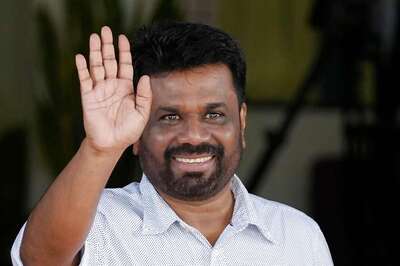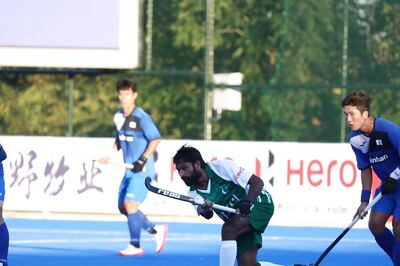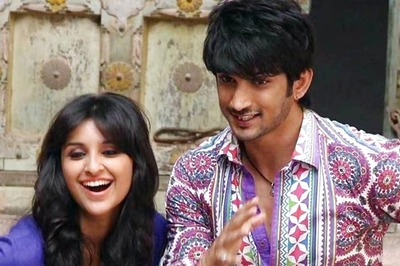
views
Like a pendulum, Rahul Gandhi has been swinging from one end to the other in an effort to strike a balance. He did not want a position when he stepped into politics. But his own rise in the organisation has been meteoric, though he refused to join the Manmohan Singh cabinet when the UPA was in power at the Centre or lead the Congress in the Lok Sabha after 2014 elections.
As an important office-bearer of the party, he was against alliances and wanted the Congress to go it alone in elections. But he did an about-turn after the party faced a string of electoral flops and began to scout for allies to take on the marauding BJP and its present-day mentor Prime Minister Narendra Modi. He was keen to give greater prominence to youngsters with whom he was more at ease, but he is getting to realise the need and benefit of keeping some experienced hands on his side.
The new Congress president has accordingly inducted around a dozen leaders from the old guard while leaving out several others from his team. The Congress Working Committee, the party’s highest decision-making body, the AICC office-bearers and a number of panels that he constituted to prepare for the 2018-19 state and Lok Sabha elections has several old timers in key positions, ranging from Ahmed Patel, who was political secretary of former Congress chief Sonia Gandhi, to former Rajasthan chief minister Ashok Gehlot.
Not surprisingly, ever since these leaders were accommodated in the new set-up, there have been questions whether the move was born out of compulsion and is temporary, tactical and geared essentially towards the state and 2019 general elections or whether it reflects a change in attitude of the party’s new chief who has now perhaps begun to invest in maxims like ‘continuity with change’ and ‘old is gold’. More importantly, it raises the question whether the old guard, which was wary of Rahul — just as he was of them — is firmly back in action?
Many would prefer to keep their fingers crossed on this one.
Much, however, would depend on what happens in the 2018-2019 polls and whether the old guard, with years of experience, is able to help him deal with the myriad challenges he faces and help resurrect the party on different counts. This includes stemming the Congress’s decline, reviving the organisation, re-establishing its appeal, image, credibility and confidence, rebuilding its voter and people-connect and forging a rapport and an alliance with like-minded forces.
Another round of electoral defeats would call for a drastic revamp and a victory would embolden Rahul to go for the wide ranging changes that he may have dreamed of initiating in the party. An improvement in performance over 2014 is likely to generate a mixed response, with some of the existing leaders perhaps replaced by others. To that extent, the accommodation of the old guard is at best valid till the 2019 general elections.
Even at this juncture, for every veteran Rahul has accommodated, there are others whom he has bypassed or marginalised while building his new team after taking charge of the party from his mother Sonia Gandhi.
It is true that Rahul Gandhi could not have accommodated every leader who was important during and before the Sonia Gandhi-era in the party. But there is a reason why he has chosen one and not the other from among the old guard to help him out in his new innings, while, at the same time, roping in the younger lot as key figures for the future.
Responding to performance, need and loyalty
Ashok Gehlot has emerged as the new points-person in the party after overseeing the party’s impressive electoral performance in the assembly polls in Gujarat, which Modi had lorded over before becoming prime minister, and in the by-elections in Rajasthan, as well as helping the party form a government in Karnataka.
Performance and delivery became the yardstick here, with many in the party seeing the former Rajasthan chief minister as Rahul’s eye and ear at the moment. Digvijaya Singh, the veteran leader from Madhya Pradesh, who was once believed to be close to Rahul, had to pay for his ineptitude of letting the BJP walk away with Goa even though the Congress had emerged as the single-largest party in the elections in 2017. Singh is nowhere on Rahul’s radar presently though his marginalisation could hurt the party in Madhya Pradesh elections.
The induction of Ahmed Patel, or Ahmed Bhai as he is popularly called, as treasurer in place of old-timer Motilal Vora caught many off-guard in the backdrop of speculation that the Nehru-Gandhi scion was on a different wavelength from the most powerful functionary of team Sonia.
The obvious reason for his selection was the vast network and contacts he had built over the years across parties, business houses, corporates, bureaucrats and leaders that would be valuable while mobilising resources for the cash-strapped organisation or wooing allies and partners to take on the BJP in the elections. The move was the need of the hour for Rahul as the party is not in power in any big state. The biggest in its kitty of less than a dozen states are medium-sized Punjab and Karnataka where it is in alliance with the JD(S).
At the same time, Patel’s induction was also a gesture to his mother who, as party president, had placed her faith in him. As treasurer, the 69-year-old low-profile Congress leader who was handpicked by Indira Gandhi and was closely associated with former prime minister Rajiv Gandhi, would be important, but he would not have the same clout that he did as Sonia’s political secretary and trouble shooter who delivered on many fronts, was privy to several behind-the-scene developments and decisions and had access and controlled access to the Congress chief. Not many in the party would forget how he and Ghulam Nabi Azad asked Sitaram Kesri to step down as Congress president in 1998 to pave the way for Sonia’s elevation.
Azad is presently leader of Opposition in the Rajya Sabha and as such finds a place in the organization, with Rahul trying to build a synergy between the two wings of the party. Azad and Gehlot had played an important role in warding off the BJP’s attempts to form a government in Karnataka after the mid-2018 elections in the state. The Congress had already suffered a setback in Goa and Manipur where despite emerging as the single largest party after the polls it remained an also-ran.
Motilal Vora, the octogenarian leader who made way for Patel as treasurer, remains a part of the AICC setup, presumably for his loyalty and services rendered to the party in general and the Gandhi family in particular on whose behalf he also supervised the working of Associated Journals Limited, publisher of the National Herald and some other newspapers. A case was filed accusing the Gandhis of cheating and breach of trust in acquiring AJL by Young India Limited, in which they are directors. Vora, Oscar Fernandes and a couple of other persons were also named in the case.
AK Antony, the former defence minister, has never really inspired dynamism. But he is credited with two important developments post-2014 centring on Rahul. One, he attributed the party’s massive defeat to the perception that the Congress was a pro-minority, pro-Muslim and anti-Hindu party. The assessment prompted Rahul to opt for soft Hindutva and make innumerable trips to local shrines and well-known religious places ranging from Kedarnath to Kailash-Mansarovar.
Secondly, as the person who headed the panel to look into the reasons for the party’s disastrous performance in 2014, Antony listed every possible factor for the debacle, including infighting, lack of viable pre-poll allies, charges of corruption and communal polarisation, except what most Congress workers at that time pointed a finger at Rahul’s uninspiring leadership. He gave a clean chit to the then Congress vice-president. It is not something that Rahul would forget.
Antony was the head of the committee to explore alliances when Sonia led the party, but the real work was being done elsewhere. A similar committee, constituted by Rahul, includes him as well as other veterans like Ashok Gehlot, Ahmed Patel and Ghulam Nabi Azad, all of whom have cross-party links which would be useful in forging tie-ups and working out seat adjustments in poll-bound BJP-ruled Madhya Pradesh, Chhattisgarh and Rajasthan later this year and in other states.
Antony, along with Gehlot, Patel and some other old-timers, also features in the nine-member Core Group comprising, among others, former finance minister P Chidambaram, Kamal Nath, who will lead the battle in Madhya Pradesh, Mallikarjun Kharge, who leads the party in the Lok Sabha, Azad, leader of Opposition in Rajya Sabha, former Union Minister Jairam Ramesh and Mukul Wasnik, a Dalit.
Chidambaram and Ramesh have also been included in the 19-member manifesto committee while former Union minister Manish Tewari and Rajeev Shukla are part of the 13-member publicity committee, both of which have some new faces.
A number of other veterans also figure in some of the other committees, including the 51-member Congress Working Committee, the party’s highest decision-making body. But the real power would appear to lie with the core group, which will oversee the preparations for the 2019 elections.
There are significant omissions also. Prominent among them are leaders like Digvijaya Singh and CP Joshi who were once considered part of Rahul’s circle. Janardan Dwivedi, the Congressman who first called for Rahul’s entry into politics, is out of the CWC, though he, along with Mohsina Kidwai and Oscar Fernandes, is part of the Central Election Committee which finalises ticket distribution and has Sonia and Manmohan Singh as its members.
Karan Singh’s place as head of the foreign cell of the party has been given to Anand Sharma. Mohan Prakash, who was once given the responsibility to handle key states like Maharashtra and Gujarat, is a forgotten figure in the party now.
On a lighter note, many would believe that it perhaps pays for the old guard to have the name or surname begin with an `A’ in the Rahul Gandhi dispensation. After all, the party chief has given importance to veterans like Ashok Gehlot, Ahmed Patel, AK Antony, Ghulam Nabi Azad and Anand Sharma. Whether this will last beyond 2019, however, remains to be seen.
(The author is a veteran journalist. The views expressed are personal.)




















Comments
0 comment